Dave Eggers discusses pitfalls of living life online
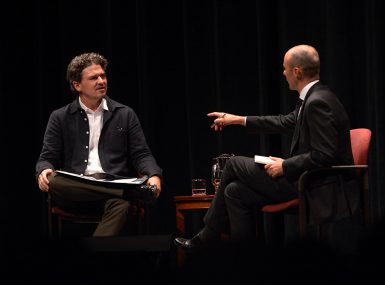
Best-selling author Dave Eggers talked about his most recent book, The Circle, and cautioned audience members about pitfalls of the digital age during a talk Wednesday evening at the IU Auditorium.
“We have seen a shift between someone’s right to know and someone’s right to privacy,” Eggers said of the online world, which can become invasive and detrimental.
Onstage, Eggers sat with Dan Moulthrop, a journalist who works with Eggers on nonprofit projects and co-authored the book Teachers Have It Easy: The Big Sacrifices and Small Salaries of America’s Teachers, with Eggers.
The pair discussed Eggers’ inspiration for The Circle, a novel that follows a young woman who works at a huge Internet company. Eggers said the idea for the novel developed as he noticed the change from face-to-face human interaction to computer immediacy.
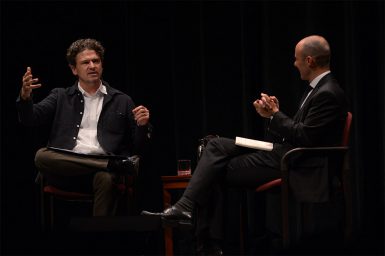
For example, a friend emailed him, and Eggers didn’t reply immediately. The friend later mentioned that he knew exactly when Eggers had read the message and had expected a reply.
“It was the real life equivalent of someone hiding in my bushes to watch me open a letter,” he said.
Eggers said he considers email to be the online version of physical mail, where he may read mail at his leisure and write a reply later. While he does not eschew technology – he goes to a public library once a day to go online – he does not feel the need to constantly interact with cyberspace.
This also is a writer’s trick to stay on task and limit distractions, said the author who described his writing process as burrowing in for four or five hours at a time to write.
“Trying to write with my email open is like writing at a circus,” he said.
Eggers said he noticed how much of people’s daily lives are spent in front of a computer screen, checking emails and social media. To some, such as Mae in The Circle, the constant feedback from social media becomes addictive. The character becomes absorbed in broadcasting her life through social media.
“Mae gets hooked on that rush of approval from her followers,” Eggers said. “She loses track of the real people in her life.”
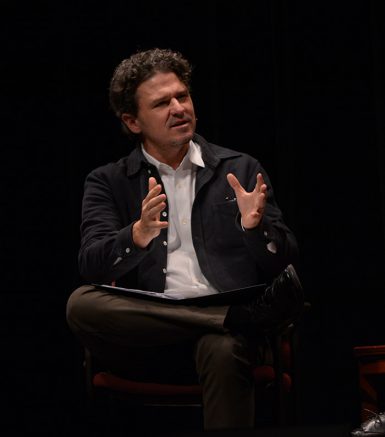
The book is a cautionary tale of the power social media can have over American lives. Likes and dislikes, or, in the book’s case, the number smiles and frowns, dictate the satisfaction of characters and their perceptions of self worth.
“It’s created a new neediness and a constant expectation of information,” Eggers said of this obsession.
A movie based on the book is scheduled for release sometime in 2016 and will star Tom Hanks, Emma Watson and Boyhood’s Ellar Coltrane.
“It’s being filmed in Hollywood as we speak, and they only have a few weeks of filming left,” he said.
Eggers spoke of the challenges adapting the book as a movie in the fast-paced and ever-changing environment of the Internet.
“A lot of the things I made up and would never thought would have passed, passed,” he said. For example, The Circle, published in 2013, uses smiley faces as well as frowns, the equivalent of “dislikes” Facebook recently announced it is considering.
Eggers and Moulthrop also talked about the “dangers of the digital lynch mob,” or people attacking others online, shaming and bullying, often anonymously.
Eggers included the power of software conglomerates like Microsoft in contributing to the erosion of privacy. Companies are trading services for access to people’s online behavior, which they use to generate data that shapes the next new online product.
“The new Windows 10 has 45 pages of terms and conditions,” he said. “We exist in this strange dichotomy because we love our friends and family and want to share with them, but it’s so easy that we push the security issue to the back of our minds.”
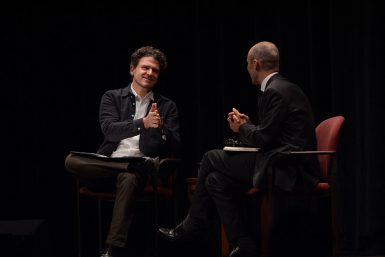
Near the end of the hour, Eggers accepted questions from the audience. One audience member asked how consumers can avoid these online pitfalls.
“If you think Windows 10 is creepy, don’t buy it and they will get the message,” he said. “Opt out when you can.”
Sophomore Jamie Zega found a correlation between her classes and the focus of Eggers’ discussion.
“I thought he brought up a lot of interesting points about security and privacy,” she said. “We’re talking about that right now in my communications law class with professor Tony Fargo.”
Eggers majored in journalism at the University of Illinois and said his training resulted in his solid writing skills, ability to meet deadlines and developing a sense of humility.
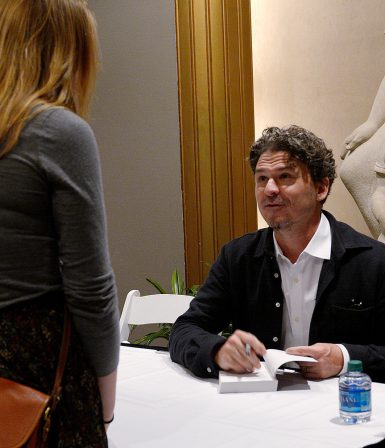
Eggers is the author of 10 books, which include memoirs, novels and nonfiction investigative works. His first novel, A Heartbreaking Work of Staggering Genius, reached No. 1 on The New York Times best-seller list and was a finalist for the Pulitzer Prize. He also is author of What is the What? a National Book Critics Circle Award finalist.
He is founder of McSweeney’s magazine and 826 National, a network of creative writing and tutoring centers.
Eggers’ appearance was part of the school’s Speaker Series and was co-sponsored by the Kelley School of Business Common Read Program, the Kelley Institute for Social Impact and the College Arts and Humanities Institute.
- More:Learn more about the school’s Speaker Series.

